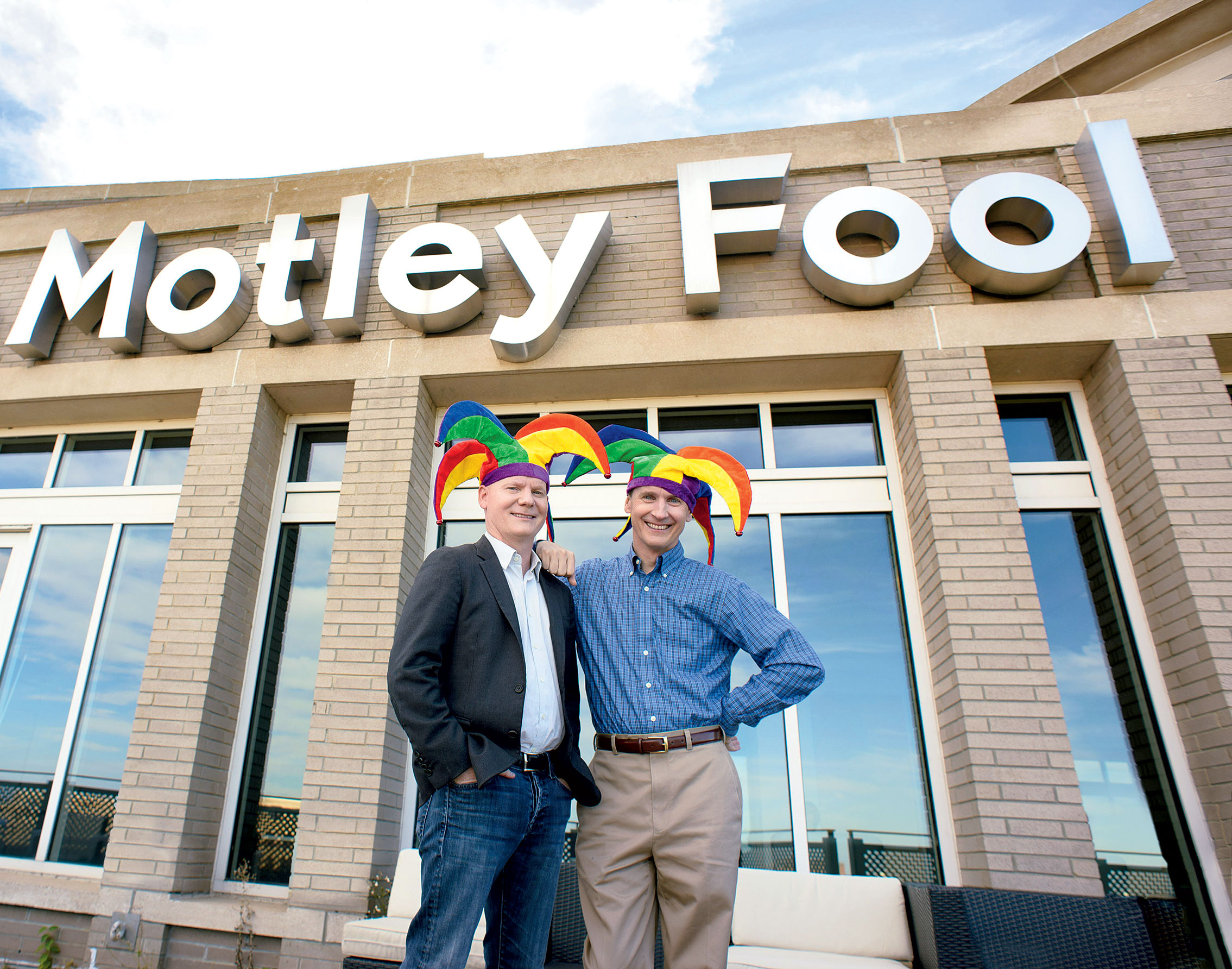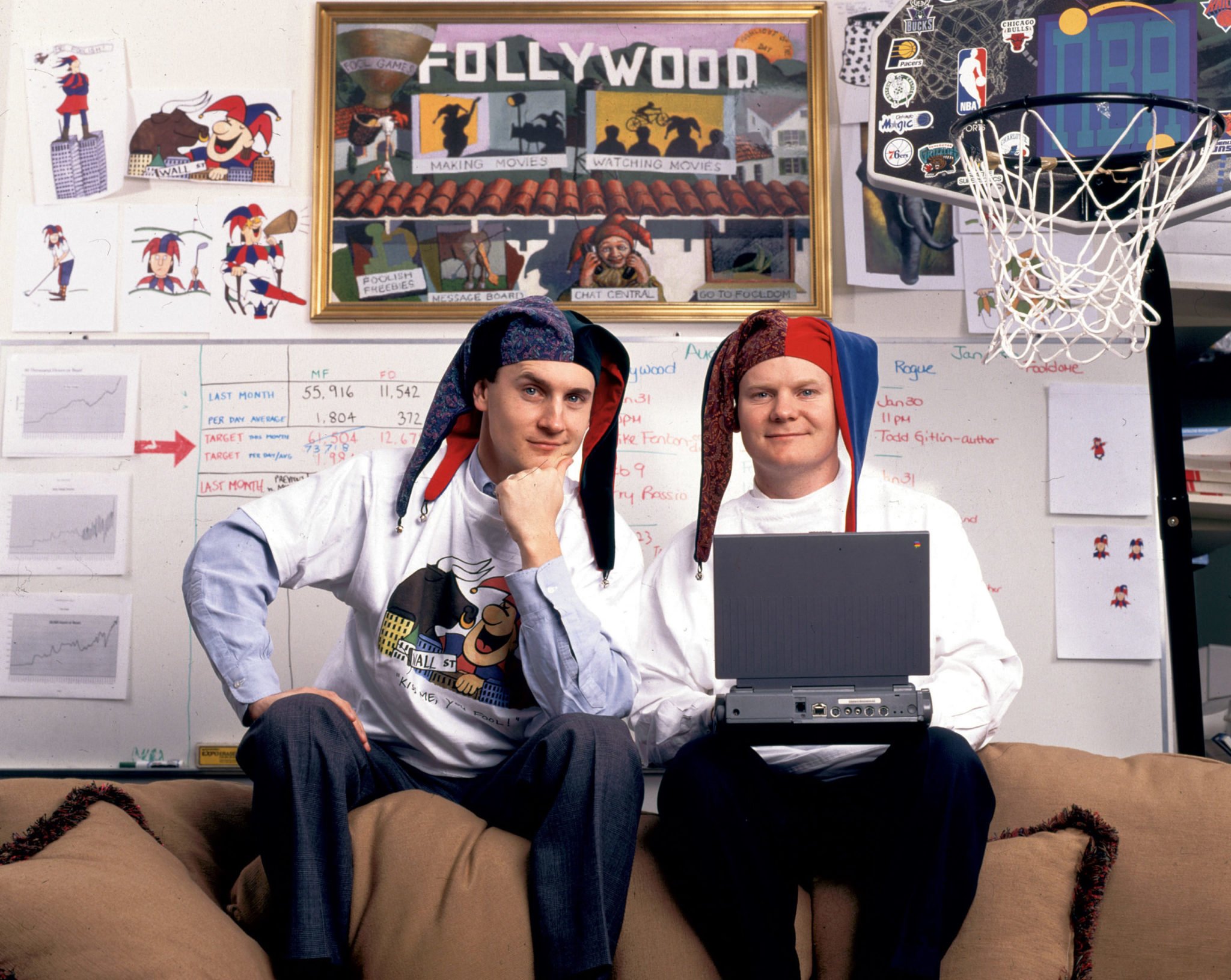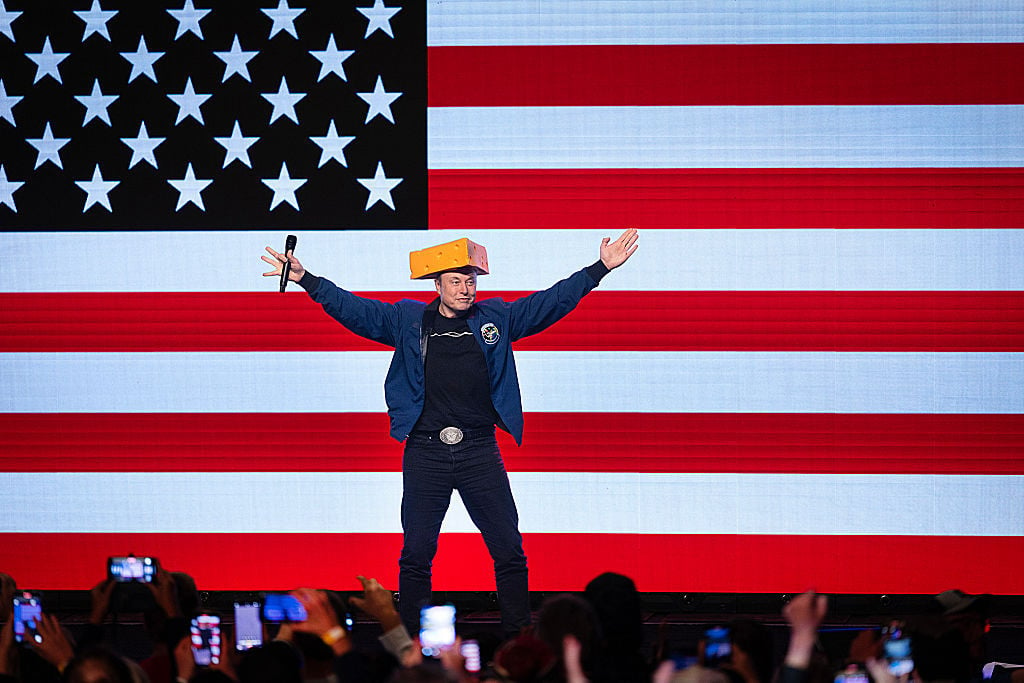In 1994, Tom and David Gardner, two brothers from Washington, took their e-newsletter about investing strategies and caught the early wave of the internet, expanding their advisory firm, the Motley Fool, to 300 employees and a half million subscribers. They built a reputation as the financial world’s merry pranksters—including a hoax they sprang on the web about a fake penny stock in Africa. The prank won the attention of the Wall Street Journal and Ted Leonsis of AOL, who called them “the first generation of cyber-celebrities” after he became an early partner.
During an offbeat interview in their Alexandria headquarters, the brothers, now in their fifties, reflected on the company in its third decade.
You guys are Washington natives.
Tom Gardner: We’ve enjoyed living here—we grew up in the city. Our father taught us how to invest, and the local investment that was significant in his portfolio was the Washington Post. So we were taught about business a little bit that way—David met Warren Buffett at a Post shareholders meeting as a child. That’s why the Motley Fool started—the game of investing.
Did you think this would last 25 years?
David Gardner: We didn’t intend to start a business. We started as a newsletter to parents and friends that we first sent out in July 1993. We began writing and included some stock picks. The World Wide Web wasn’t being used much yet. And we started to—well, explain how we [did the] prank.
Tom: We were both English majors who loved to write and communicate. We were also two kids who used to prank the WMAL sports talk show on a nightly basis. So we created a fictitious penny stock, because we were seeing the promotion of cheesy little companies and people trying to make money off of the stock price moving. So we just made up a company.
David: It went viral in its own small way.
Tom: That was the catalyst for our incorporating. AOL asked us to meet with them. Ted Leonsis slept outside our office to try to convince us. [Laughs.] Can we leave that in?
David: Like we did with the Washington Business Journal? Tom can tell the story.
Tom: The Washington Post ran [an early] feature about AOL, and Ted Leonsis . . . [described] these guys who started the Motley Fool and who then slept outside AOL’s offices to convince Leonsis to invest in us.
David: Which was patently untrue.
Tom: So I texted him on AOL Instant Messenger: “You lied! We didn’t sleep outside.” I only got a three-word response, which was Ted’s methodology—by the way, we’re big fans of Ted—but the response just read: “Perception is reality.”
Sounds kind of Trumpian.
David: Well, it drummed up huge interest, to get people psyched. He was just trying to drive that passion.
Tom: So I decided to get Ted back in the Washington Business Journal, and I said, “Ted slept outside our offices.”
David: Tom bided his time on that one for 20 years! Then they [published] it—it’s there permanently!
Tom: [to David] Hey, don’t blow this gig! This is one of our better gigs. [Laughs.] The truth is nobody slept outside anyone’s office.
Are you doing anything to commemorate the anniversary?
David: Maybe a call-out at Hamilton? Tom was an early investor in Hamilton.
Tom: It was through a college housemate, who took me to a church basement where young artists would perform their creations, works in progress. I saw Lin-Manuel Miranda there. Then later, I invested in In the Heights and Hamilton.

Maybe this is a good time to ask about your investment philosophy, which is sometimes described as unconventional.
Tom: There are 14 reasons, but I’ll name two. In general, it’s good to consider going contrary to consensus. Not in all situations. But to have an unconventional take in a market means you might, as David did, invest in Amazon months after they went public, and then never sell.
David: We did sell some Amazon, some shares. But we stayed with them all the way.
Tom: It’s an obvious winner now, but that’s something that was doubted back then—who could have held all the way through? The second benefit I’ll describe as being “lighthearted.” There are brands and businesses aspiring to be viewed as never making a mistake. Then you see the name Motley Fool. . . .
David: Two guys wearing a fool’s cap on CNBC. Like, what?
Tom: We had a bond trader in Houston who said it took him a year of watching us to finally subscribe, because he couldn’t tell if we were serious. Because of the long-term perspective, we’re willing to look differently.
David: We find innovative companies early and hold them well past when people sell. We are unconventional compared to the traders, whether it’s [CNBC host Jim] Cramer changing his mind every other day . . . .
Tom: You’re calling out people?
David: I am. Cramer is emblematic of the way people think you need to follow the markets, constantly being willing to sell at any moment. For us, as Fools, we’re far lazier. We find a great thing and keep holding it.
What are some other notable companies you found early?
David: Elon Musk came to the Fool headquarters in 2011. After that, we recommended the stocks and held that ever since. The founder of Whole Foods, John Mackey—one of the world’s great living entrepreneurs—came in and gave a free talk here about 11 years ago, and now he’s on our board.
There’s a millennial generation on the rise with high rates of financial illiteracy—myself included, probably. How would you explain the basics of the Motley Fool approach to someone like me?
Tom: Index funds—our whole position is that should be your starting point, or your end point if you’re not interested in the subject at all. Add to one or a few large index funds, sock it away every month, pay off your credit cards, and your whole investing challenge is done. Looking at data on stocks going back a hundred years, it’s pretty easy to see what the game is going to look like: You’re going to get between 6 and 10 percent a year—better than some of the other vehicles you can get—and also highly liquid.
David: It’s a three-step program: If you save money, pay off credit cards, and put it into index funds—and do it the rest of your life—you’re living up to the principles of the world’s greatest investor, Warren Buffett [who said that by investing in index funds, you’ll do better than 90 percent of people].
What’s next for the company?
Tom: A venture fund, which we launched this year. Our venture fund raised about $140 million. And we launched a business called the Ascent, which is designed to help a younger audience, to make the best decisions about credit cards, mortgages, student loans and to give everyone an entry point into “Foolishness,” whether or not you’re ever going to be someone purchasing stocks directly. We’re all making important investment decisions every day of our lives. It was a trickle at the start, but it’s got a big growth rate in the last six months. And we have 30 million unique visitors coming into the Motley Fool each month.
David: That sounds big, but there’s 7 billion people on the earth. [Laughs.] It sucks!
Tom: Let’s say the first 25 years of the company history was to really prove that we could create a viable, sustainable business. We’ve done that. But the next 25 years, we have to reach many more people at their different places in life, whether they’re paying off credit cards, thinking of starting a business, changing their career.
David: We changed our mission statement a few months ago: To make the world smarter, happier, and richer. Some companies do each: Smarter, I would say Google. Happier, Disney. Richer—there are lots of companies that make the world richer. But if we do it right, we’re doing all three.
This article appears in the April 2019 issue of Washingtonian.



















